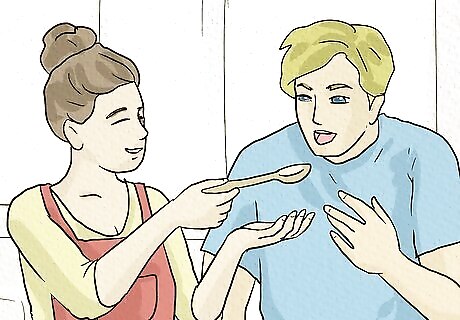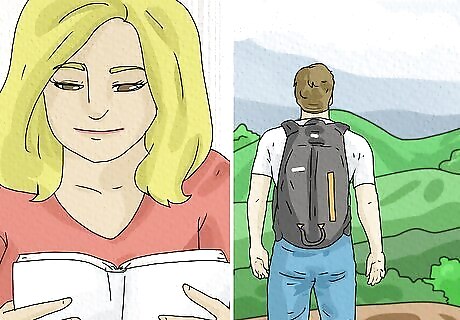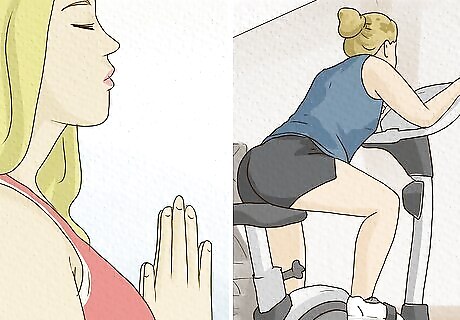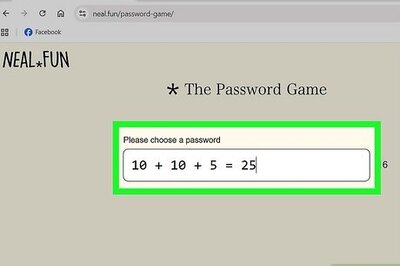
views
- If your avoidant partner opens up to you, reciprocates or initiates PDA, or tries to bond with you, they may be in love with you.
- An avoidant in love will commit to the relationship. They’ll claim you as their partner and they’ll introduce you to friends and family.
- You can have a thriving relationship with an avoidant by giving them space in the relationship and being patient while they learn to be more emotionally vulnerable.
Signs Your Avoidant Partner Loves You

They start to open up emotionally. Emotional intimacy is a big deal for avoidants. Their avoidant attachment style means they usually go through life without sharing what they’re thinking or experiencing inside. If your avoidant partner starts to share how they’re feeling with you or open up about their deepest secrets, it’s a sign they trust you and are getting attached to you. Keep in mind that an avoidant’s idea of “opening up” might be very subtle compared to an anxiously or securely attached person's version of emotional vulnerability, and what may be hard for your avoidant to share with you might come across to you as no big deal.

They engage in nonverbal PDA. Because avoidants can easily get uncomfortable or overwhelmed by verbal expressions of love, they often show their feelings with their actions, meaning they may be more likely to kiss you than to tell you they love you directly. Try initiating PDA with your avoidant partner and see how they respond. If they reciprocate rather than avoid your touch, it’s a sign they’re becoming more comfortable in the relationship. If your avoidant partner doesn’t respond to your PDA, it can sting! But it doesn’t necessarily mean they don’t care or won’t reciprocate in the future. They may just need time. Keep in mind that avoidant people are often more amenable to private displays of affection, so if you try to hold hands at the mall and they withdraw, try not to take it too personally. Reach for their hand when you’re alone at home and they’ll be more likely to reciprocate. Because avoidants are so uncomfortable with intimacy and may not have had that much practice with it, they might be super awkward when they do it! Be as encouraging as you can, and celebrate their efforts. They’ll get better at it!

They listen to you. For avoidants, getting close to a romantic partner—or anyone, for that matter—can be a scary thing. They tend to…well, avoid it. If your partner actively listens to you when you speak and is curious about you, it’s a sign they’re attached to you and they care deeply for you. If they put their phone down when they're hanging out with you, it's a big sign they're invested in what you're saying. Other signs they're actively listening and engaged when you speak include maintaining eye contact (this can be hard for an avoidant person to do!), nodding, and giving responses that further the conversation.

They go out of their way to spend time with you. For many avoidants, the idea of falling for someone is terrifying because they worry, deep down, that they might lose the person they love. So they often try to keep people at a distance for as long as they can out of reluctance to take things to a deeper level. This being said, if your avoidant partner prioritizes you and goes out of their way to spend time with you, they’re likely in love. Big, big love. An avoidant in love will try to spend as much time with you as they can. Sure, they’re an avoidant, so they’ll still need a decent amount of space. But they’ll need way less space with you than with everyone else.

They try to get to know you better. You might notice your avoidant making little efforts to bond with you. Maybe they’ll ask you about your likes and dislikes, or they’ll invite you to participate in a shared activity to give you the chance to grow closer and get to know each other better. We try to bond with people we love, and your avoidant partner is no different in that regard.

They’ve introduced you to their friends and family. An avoidant’s inner circle is usually only breached by those they care deeply for. So if they’ve invited you to Sunday dinner with the fam or to their best friend’s wedding as their plus one, it’s a huge honor: it means they want you there for the long haul.

They want to move the relationship forward. An avoidant in love won’t shy away from taking their relationship to the next level. If your avoidant is ready to take the next big step, whether it’s moving in, getting married, or even just calling you their partner, you know they’re serious about you.
How to Be in a Relationship with an Avoidant

Be patient and don’t rush them to commit. Avoidant people want love just as much as the rest of us non-avoidant people, but they have more difficulty committing, even when they want to. If you are patient and don't pressure your avoidant partner to go faster than they're comfortable with, over time, they may slowly start to feel safer in the relationship. Essentially, the way to have a thriving partnership with an avoidant is to just…let them be themselves and not put any pressure on them. This doesn’t mean you should let your avoidant partner’s needs outweigh your own, and needing some level of commitment from your partner is a very valid thing. But if you want to be with an avoidant, you’ve got to go slow.

Show them you love them—don't just say it. Just like avoidants are more likely to show they love you with their actions, they’re more receptive to actions from you rather than big proclamations of undying devotion. That doesn’t mean you can’t still tell them you love them, especially if words of affirmation is your love language, but try to back up your words with deeds too.

Give them plenty of space. The poet Rainer Maria Rilke said that in an ideal romantic relationship, both parties “stand guard over the solitude of the other.” For many avoidants, this rings true: they may truly want a relationship deep down, but they might feel like they can’t be in a couple without losing their independence. Show your avoidant this isn’t the case by encouraging them to take space for themselves regularly and by taking alone time for yourself as well. They’ll appreciate the room to breathe. Some avoidants may initiate taking time to themselves, but others may worry that asking for time apart will upset their securely or anxiously attached partners, and they’ll choose to suffer in silence instead. If your avoidant hasn’t had much alone time lately, try asking them if they’d like any. They’ll not only appreciate the offer; they’ll be glad to know you understand their need for space.

Communicate calmly and clearly during arguments. In serious conversations, heightened emotions can cause an avoidant to shut down. It’s hard, but using calm, clear language, not raising your voice, and not giving in to big displays of emotion during a tough discussion can make all the difference in a relationship with an avoidant. They’ll be more likely to actually hear what you’re saying and not shut you out or just say what you want to hear. Using “I” statements may help your avoidant partner feel less defensive and more receptive to what you’re saying. In serious discussions, avoidant people can feel easily threatened by “you” statements—as in, “You need to hug me more,” or “It’s your fault we aren’t more intimate.” Opt for “I” statements that reflect your role, your needs, and your feelings: “I wish you would hug me more,” or “I’d like to be more intimate.” Try not to raise your voice during serious discussions. If an argument starts to get too heated (for either of you), communicate that you're feeling too upset to talk in the moment, that you love them, and that you want to pick up the conversation again later when you've both had some time to rest and reflect.

Be consistent and reliable. Because avoidants are so slow to trust, erratic behavior or failing to follow through on your promises can cause them to withdraw. Follow through on your promises and show you’re dedicated to your partner and the relationship, and you and your avoidant stand a good chance of having a long and happy relationship.

Avoid prioritizing your partner’s needs over your own. While dating an avoidant can take a lot of effort, this doesn’t mean you need to neglect your own needs in your relationship. In a thriving partnership, both parties feel heard and seen—not just one of them. So while you may need to be patient with some aspects of your avoidant partner’s attachment style, it’s imperative that you’re free to communicate your own needs as well and that you BOTH put in the effort to make each other feel safe, happy, and loved. Avoidant people may have difficulty being intimate with their partners, which can leave their partners feeling neglected, rejected, or unwanted. The responsibility doesn’t lie solely on your shoulders to make the relationship work. Communicating your needs to your avoidant may involve being calm and patient so they don’t shut down emotionally, but that doesn’t mean you can’t be forthright about how you’re feeling and what you need from them.
Can avoidant behavior be healed?

An avoidant person can learn to become more secure over time. You aren’t responsible for changing your avoidant partner’s attachment style, but being in a stable relationship can help an avoidant person learn to be more securely attached. Openly communicate how their avoidant behavior makes you feel, and gradually, they may learn to become more secure. If you’re with your avoidant long-term, they might still be generally aloof, but you’re more likely to see signs of their attachment to you over time as they learn to trust you and get more comfortable showing you how they feel. Therapy can help people with insecure attachments work on their attachment styles. Whether you and your partner seek couples counseling or they go to solo counseling, talking through their attachment issues can help them learn to become more emotionally open and comfortable with intimacy.


















Comments
0 comment